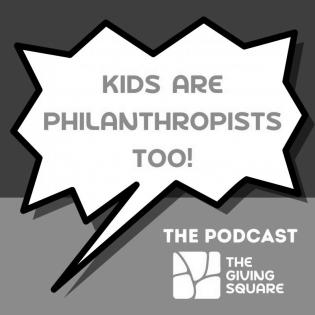How Did a Nun, a Farmer, and a Teacher Help a Refugee?
In this episode of the Kids Are Philanthropists too! podcast, we continue to explore immigrant and refugee experiences with a personal story from special guest Agnes Leshner.
Our host is Amy Neugebauer with 11-12-year-old co-hosts Jayden, Alona, Leo, Ismahil, Ibrahim and Sam, all part of The Giving Square community.
Learners will know and be able to
- speak with respect and empathy about refugee and immigrant experiences.
- name some organizations that help people get settled in the U.S.
Link to the Kids Are Philanthropists Too podcast episode 5: "How did a nun, a farmer, and a teacher help a refugee?"
Related Resources:
- Lubna and Pebble by Wendy Meddour (author) and Daniel Egnéus (Illustrator) literature guide
- A Different Pond by Bao Phi (author) and Thi Bui (Illustrator) literature guide
- La Frontera by Deborah Mills (author) and Alfredo Alva (author) and Claudia Navarro (Illustrator)
- Gibberish by Young Vo
- Drawn Together by Minh Le (author) and Dan Santat (illustrator) literature guide
- Muhammad Najem, War Reporter by Muhammad Najem (author) and Nora Neus (author) and Julie Robine (Artist)
Identify an organization that helps people get settled in the U.S.
Instructions
Opening Question
What challenges do you think refugees experience when leaving home where it isn't safe and coming to a refugee camp in a new country?
Play the Kids Are Philanthropists Too podcast episode 5: "How did a nun, a farmer, and a teacher help a refugee?"
Discussion Questions
- What surprises you about Agnes’ story? What did you learn from her experience?
- What do you think it would have been like to be Agnes? Why was the doll so important to her then, and now?
- Why do you think the farmer and the nun helped Agnes and her family?
- How did the teachers help the children get assimilated (or feel a part of) their new community?
- Why does Agnes care so deeply about helping others?
Extensions
- Talk to family members about what makes up their identity. Ask how much of their identity is formed by where they live now and how much is formed by their country of origin (if different).
- Ask family members about your family’s immigrant stories and any artifacts that have been handed down.
- Explore personal narratives from books, movies, and art that share the refugee or immigrant experience.
- Identify local refugee or immigrant-serving organizations in your community. Find out what help they need.
- Find out whether there are people new to your community that you could welcome with friendship or information.
- Listen to our latest podcast.
